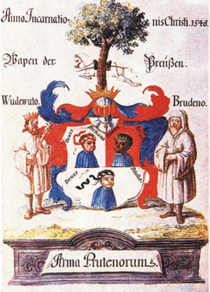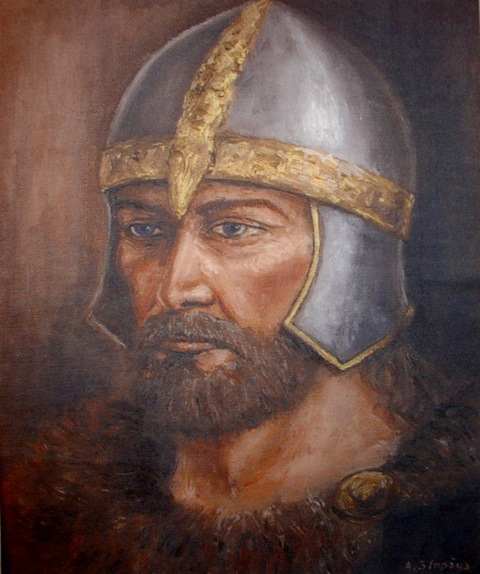
The history of ancient Prusai WHO WERE THE PRUSAI? ARCHEOLOGY COULD PRUSAI BE CHRISTIANS ? Mieszko I Poland THE ARMS AND THE WAY OF FIGHT THE CONQUEST, I, II UPRISING THE III-rd PRUSAI UPRISING The PRUSAI KNIGHTHOOD OPPOSITION What has happened to Prusai? THE GERMANIC ENSLAVEMENTS
The Battle of Grunwald
Culmland Banner The Prusai Maps
PRUSAI
Prusians Heroes Prominent Prusian Where you are, Prusai?
COAT OF ARMS
The Coat of Arms THE COAT OF ARMS PRUS I, II, III Unknown version Prus I,II, III Prus - name and Coat of Arms UNKNOWN COAT OF ARMS EUROPE MONARCHIES
PRUS DESCENDANTS
Pilewski
KURPII
The Kurppii Genesis
THE DISPUTE ABOUT HISTORY
German militarism Tadeusz Mrozinski
CULTURE
About the Prusai language The Prusai language and its sources ART AND PEOPLE Archeology Prusian Babas
PUBLICATIONS
Die Altpreußischen Personennamen Download
Elbling Dictionary
FORUM
FORUM - ARCHIVES
MAIL: PRUS@PRUSOWIE.PL
Counter
Counter
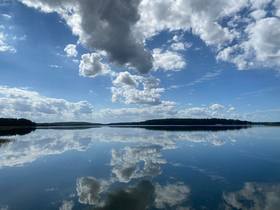
HERKUS MONTE - THE GREAT LEADER OF THE NATANGS AND PRUSIANS
FROM THE MONTEMID FAMILY
An heroic figure without equal in contemporary Europe and later, which inspired the Polish bard
Adam Mickiewicz to write
“Konrad Wallenrod”. After pacifing Pomezania, the peace treaty of 1249 was not activated,
with social structures of
the Pomezanians being crushed by separating the leadership elites and resettling them far from its social roots.
The Pomezanians, who in the first rising fought alone, no longer played a significant role in further conflicts with Teutonic Order.
The band of Teutonic Knights, eager for further territorial conquest and new killings was never noted for courage,
we know this from their battles with the world of Islam. This was also true in the case of Prusians. Fear made them
stop deep forays into Prus territory, and they chose a different tactic.
The Order’s conquest of the Prusians took place along the coast of the bay of the Vistula, from which
bestial expeditions were made into the hinterland. Previously however, dormitory forts were set up on the coast,
to which the Teutonic Knights returned for safety after their expeditions. Such forts were established as the Order moved across the Bay.
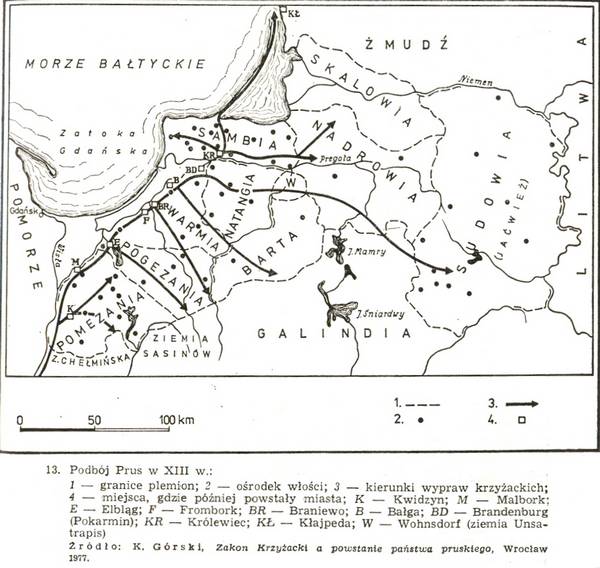
In this the Teutonic Order reached the land of Natangs. To-day this is the territory through which the Kaliningrad Region border runs.
The leader of the Natangs was Nobiles, from the prominent family of the Montemids.
Surrounded by the Knights and seeing the enormity of the cruelty and bestiality, he had no choice but to save his family and prevent
the further extermination of the Natangs, he accepted the giving of hostages to the Order.
The standard practise of invaders was the taking of men and children able to work, if they had not been previously murdered.
Among the hostages was the young son of the Montemids, Herkus. Fate did not spare the wealthy, their children were eagerly seized,
so that revolts would not take place. In their calculations and cruelty the Order had no equal.
The underage Herkus was not sent to work for the Knights. He was destined for deportation and sent to Magdeburg for propaganda purposes,
to show how the Order cared for the Prusians and turned them into Christians. He was publicly Christened and educated in Order quarters.
Naturally in the German style,with the thought he would become fully germanised.
The young and able Herkus was very eager to absorb knowledge, he very quickly learned languages, not only German, but also Latin,
which he spoke fluently. His abilities were noted amongst the monks, who saw in him a chance to use his personality in the conquest
of the Prusians.
In line with this decision, Herkus began to be schooled in Knightly art of warfare. He showed unusual abilities in learning the craft
of knighthood and his mastery of using sword. He very quickly became unequalled, not only amongst his age contemporaries.
This to the great satisfaction of the Order, who expected they could use him in Prusia.
However, the young Herkus undoubtedly could not forget the sufferings and cruelties inflicted on his people,
together with the close to him Natangs, which happenings he saw with his own eyes.
Born around 1225, seized in the 15th year of his life, he returned to Prusia as a knight in his mid twenties, but in the attire of
Teutonic Order.
He did not spent much time with the Knights of the Order. He visited his subjugated people,the Montemids, and the Natangs bleeding
to death at the hands of the Order.
The Order concerned that the Prusians were converting to Christianity and it might loose its chance if setting up its own state,intensified
its efforts to systematically destroy the Prus people.
An act of maximum bestiality was the inviting of the Prus chiefs to the negotiating table. When the Prus elders arrived at the peace
negotiating, all were murdered.
After the banquet, all doors and windows were barred,the hall was set on fire and nobody survived. This event could be compared
to the perfidy of the sign of the Auschwitz concentrating camp
“Arbeit macht frei” (work makes you free).
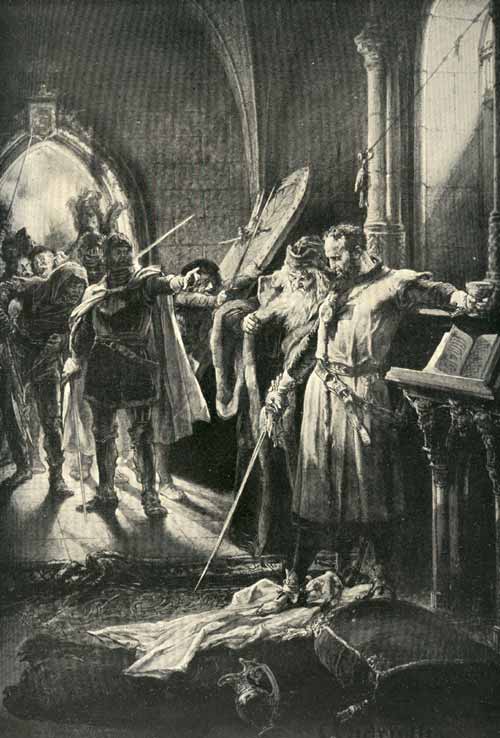
Herkus Monte discards the Teutonic Order dress and becomes the leader of the Prus peoples. This began his immortal odyssey.
The year 1260 marked the beginning of the second rising of the Prusians with the aim of restoring their old freedoms and liberty,
but not against Christianity.
In fact, before the rising a letter was sent to Pope Urban IV accepting Christianity, and formally placing Prusia under the care
and protection of the Holy See. Although the brutalities of the Teutonic Order were mentioned Urban IV ignored the letter, and his
successors called for further crusade against the Prusians,as did Clement IV in 1265. Under this influence, the whole of Europe
started sending, not just from the German states, elite forces of knights to supress the Prusians.
In these conditions Herkus Monte began to attack the Order wherever possible, panicking the monks of the Order, who were uncertain
when their time would come.
On 21st January 1261 Herkus Monte won a spectacular victory over the elite of Teutonic Knights. I will mention only the battle over
the Teutonic fort of Pokarvis, on the coast of the bay of the Vistula. Herkus started this campaign by waiting until the main force
of the Knights left on an expedition deep into Prusia, Then stormed the fort taking the remaining knights prisoner. He then waited
for the return of the main body of the knights: very few survived of the second battle. At the same time the Prus prisoners of the
Order were released.
The tragic ending of the battle for the Teutonic monks became well known amongst the Prusians. Herkus had shown that the Order
could be defeated. The invaders started to panic because of the tactics adopted by the Prus leader.
Amongst the prisoners was a knight called Hirzhalis, a friend of Herkus from the time of his deportation in Magdeburg.
It has to be said that Herkus, after breaking with the Order, together with his commanders, returned to the old Prus beliefs.
According to one, after a victory one of the prisoners had to be burned at the stake as an offering. For many this was possibly
an act of barbaric pagans.
The question has to be asked - what sort of act was the murdering of the defenceless population of Prusia in the name of the Christian faith?
In the choice of who was to go to the stake, Hirzhalis was chosen. Herkus wanted to save his friend, and convinced the elders
to a second ballot, which again convicted Hirzhalis. When this happened a third time, he went to the stake.
Herkus was fearless in pursuing the Teutonic forces wherever they went, giving them no respite or chance to re-organise. Often,
disguising himself as a Knight, he mobilised them to expeditions against the Prusians, leading them into carefully prepared traps
by his troops. The Knights never returned from these expeditions, so they could not warn others about their fate.
Herkus was aware of the continuous flow of reinforcements from both German and European Knighthood. This took place by sea through
the ports of Elbing, Balga and Konigsberg. The whole might of European Knighthood was concentrated on the Prusians.
He called for a council of Prus elders, which decided to surround and attack Konigsberg, and almost all of Prusia was freed from
marauding bands of the Order.
It has to be said that Pomerenian prince Msciwoj II came to the aid of Prusians, with whom they jointly reduced the delivery of
the supplies to the ports of Order.
The Sambians in Konigsberg destroyed the Order’s fleet, whilst on land Herkus Monte with the Prusians laid siege to the fortress.
But the fortress was too strong to be taken, and the siege had to be abandoned. Adding to the lack of succes in Konigsberg, Herkus
was seriously wounded. In spite of this, Herkus decided to continue attacking the Order where it was least expected.
In 1263 he organised a lightning expedition to the Chelmn land, and the Order suffered very heavy losses. When he retreated,
the Grand Master of the Order, Helmerich, himself, with elite troops, led the chase.
Herku Monte did not let himself be surprised and with his forces met the Master at Lubawa. Certain of victory the Knights quickly
attacked the Natangs, but the battle turned into a total defeat. The Grand Master himself was killed, as well as all members of his
elite force.
In 1267 the second visit of the Czech king Przemyslaw Ottokar II, and a year earlier Otto III
of Brandenburg, caused that Natangs of Herkus Monte were surrounded, and their situation became ever more difficult. Worse, their
Prus neighbours could not cope with the ever increasing numbers with new knights. They all suffered from hunger, caused not only
by the Knights pillage, but also because what the latter could not steal they burnt and destroyed.
The Knights of the Order did not cease with their refined cruelties: 12 children, kept as hostages in Elbing, had their eyes gouged
out and were sent back to their parents.
For 7 years Herkus Monte fought with the elite of European Knights who called themselves Christians. In these battles all the
Order forts, with the exception of the ports, fell to the Prusians. The arrival of ever increasing forces from Europe did not
let him seal this hard fought bloody freedom, to add to which the new Grand Master Dietrich II of Meissen was extremely bloody
in his settlement with the Natangs.
The attacked home of Herkus fell and though wounded, he escaped and hid in forest of Natangia to evade his pursuers.
In 1273 the hiding place of Herkus Monte was found.
He was immediately hanged, and fear that he could recover led to his body being put to the sword.
In the history of the conquest of Prusia Christian Europe has a white spot and apart from barbarity has no glory.
Soon we shall see whether it will be ready to admit its guilt.
In the absence of the great leader of Prusia, Herkus Monte, the second rising weakened but in total lasted 15 years.
Herkus Monte Film
Dear Prusai and Supporters,
A few days ago I received the script for the film Herkus Monte (it is not final and depending on finances will be developed and improved) which I had sent to all known me mail addresses with a proposal to achieve it with the joint effort. With the contribution of the Prusai and the Prusians Supporters. The text of the email is below. Each of the declared amount of different values is with the same meaning, and to no one brings shame that is smaller than the other. Every penny is very valuable. Every penny will be spend with the utmost caution. All forces are invited with all your hands on the deck. It is the same as if we went for voting. Each voice has its equal weight. In this way we can bring pride not only to ourselves also to those who could not or did not want to join us. Of them, we must also keep in mind. Every initiative, every idea or question in the discussion will be given access to the Forum. Once a month we will list declaring complement, if they wish to remain anonymous please notify.
Welcome,
I appeal to all for who the revitalization knowledge of Prusai is close to take decision for financing film about Herkus Monte.
I know that not all recipients are wealthy but are also wealthy, and only such a difference exists between Prusians as well their Supporters, to whom I write. Please, I ask the wealthy for generosity, the other for subsidies if their household budget allows. At this stage, please, only declarations of possible grants.
Personally, I will not handle the money. Among the recipients are accountants. I think needed is a special Fund.
The ownership of the film should be the Fund. After the sale of one film could be able of funding the next film.
Before doing the film a full reconnaissance with film makers close to me will be done to make sure that the film will be a success. I also have a lot of questions to the director, the screenplay he wrote was when I hoped will finance the movie from the sale of the book, but despite the efforts that did not happen. Until there is certainty that finances allow realization the film, the talks will not take place with.
I know that not all sympathize with me. I believe that the revitalization knowledge of Prusai and making this film should be above all.
Slawomir Klec Pilewski
PS. Information from Latvia about hymn to the glory of Herkus Monte
Labban dēinan,
Do you know about this?
https://www.youtube.com/watch?v=SfBzKoMiGi4
A Latvian metal band wrote an album about Prūsai.
Song glorifying Herkus Mantas
Regards,
Sannija
Hi Slav,
It is a whole album about Prusians. A lot of it is in Latvian, maybe I should translate it to English.
Sannija
RECEIVED DECLARATION
26.07.2015
Welcome,
I am a film editor - the National Film School in Lodz completed at the edition faculty. So I can thus help the production of the film, serving knowledge and experience, possibly by assembling filmed material.
Greetings
Krzysztof Trzałkowski
28.07.2015
The idea for the film I support wholeheartedly, I put 2 thousand zloty per year. If the Poles consider the Prusians Wild Gentiles they should see them just such. Let them know that these people were 100 times more valuable than civilized, christianized medieval peasants, as well "knighthood". Let them get to know Prusai culture, customs, way of treating nature and themselves Prusians.
Native Indians of North America have done themselves about their leaders, the fictionalized document:https://www.youtube.com/watch?v=Wr36qJgto1I
Great Indian Leaders liked the narrative, the words and phrases, ie. 1840 years the white man, the great white father (= president), talking wires (= telegraph). The film is steeped in magic and spirituality because it also separates them from the white man who believes only in money. I wish you good luck, soon we succed.
Tomek Zielinski
29.07.2015
Declare two thousand zloty
Slawomir Klec Pilewski
30.07.2015
Welcome,
I fully support your initiative for the film about Herkus Monte. Pre-declare the amount of 100 zł for this noble goal.
Greetings.
Maciej Wiśniowski
31.07.2015
For film making about Herkus Monte I declare 100 Euro
Georg Habelmann (Berlin)
Manfred Kaireitis 50 Euro, Germany
Janusz Pilewski 1 000 PLN, Poland
Krzysztof Gawron 300 PLN, Norway
 www.Prusowie.pl - polski
www.Prusowie.pl - polski